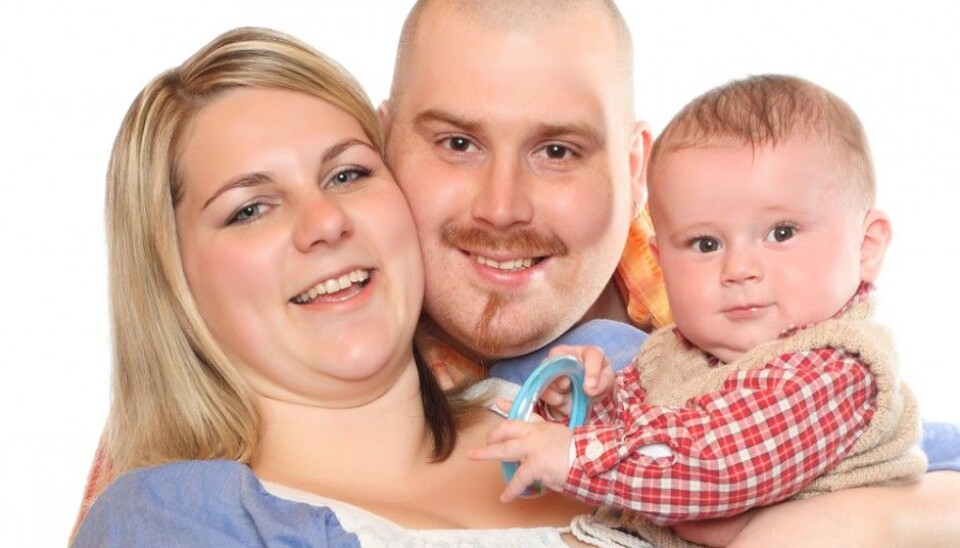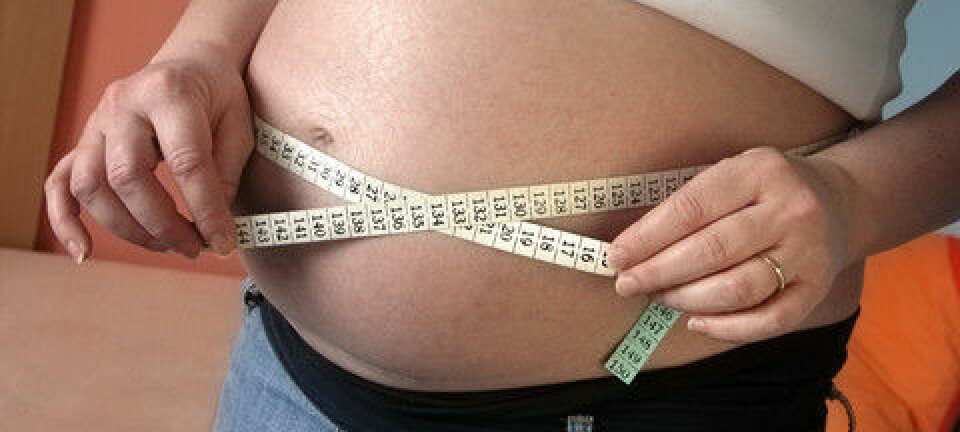
Heavier parents get fatigued kids
When parents are overweight their children tend to get to bed later and sleep less.
Denne artikkelen er over ti år gammel og kan inneholde utdatert informasjon.
People who are overweight or obese often have sleep problems and insomniacs are often overweight. Sleep problems and excess body weight have long been known to be interconnected.
But Swedish researchers have now discovered that the tie also affects the children of people who are overweight – right down to the toddler age.
Later to bed
“Children from overweight families go to bed later, get up later, spend more time falling asleep and sleep more poorly,” states Lijuan Xiu.
She is working on her doctorate at Karolinska Institute in Stockholm. A project called Early Stopp, aimed at preventing obesity, has been running in the greater Stockholm area for six years.

Xiu has used data from the project to investigate the connection between parents’ impact on the bathroom scales and their children’s sleep patterns.
Medical researchers who specialise in sleep recommend that toddlers aged one to two should get from 11 to 14 hours of sleep daily. Among the 167 children that Lijuan Xiu used in her study, it turned out that a large share of the overweight parents’ children in this age group sleep less than ten hours per night and less than 12 hours in total per 24 hours. These differences are not exactly staggering. Nor are they statistically significant enough for unequivocal conclusions, but the researchers think they indicate a link.
Early intervention
“The connection between lack of sleep and unhealthy diets has been reported among adolescents and adults. But it hasn’t been researched much in early childhood,” says Xiu. She asserts that parents influence younger children strongly, but adds that researchers currently lack a good understanding of this link.
“Initiatives against obesity need to get under way in early in childhood and implemented on a family level,” Xiu says. She thinks it important to find out whether child obesity can be hampered by getting children to change their sleep patterns.
The chicken or the egg?

But which came first, excess weight or insufficient sleep? Lijuan Xiu has no pat answer:
“We think the correlation between sleep and obesity hinges on a number of factors. Also, research indicates that other environmental factors which develop within a family, such as stress, eating and activity levels, have a very large impact on the development of sleep habits as well as overweightness.”
The Swedish researchers point out that insufficient sleep and high BMI are linked in a number of studies of adults and children.
“Our group has previously found this in children aged six to ten, but we know it also applies to one-year-olds,” say Xiu and her advisor, Mirjam Ekstedt.
Stress and metabolism

Overweight persons sleep worse, in part because of snoring and unhealthy pauses in breathing – sleep apnoea.
“It is also known that the same sleep pattern – frequent awakenings – is connected to high stress levels among parents and children. Stress is a risk factor for metabolic syndrome and obesity,” point out the two Swedish researchers.
“Another explanation might be that sleep is vital for restoring the brain. A lack of such restoration leads to fatigue,” they say. “In turn this makes you less motivated to engage in physical activity and causes you to eat more.”
“We have also found out that much exercise and intensive physical activity during the day can promote good sleep quality.”
Not an obesity cure – yet
Nevertheless, it would be premature to say that improving sleep habits is what is need to keep children from growing up and becoming morbidly obese.
“We cannot say yet whether little sleep leads to obesity or that getting more sleep would lead to weight loss,” says Lijuan Xiu.
Nor does she assert that overweightness or obesity are the driving forces leading to poor sleep habits within the family:
“That correlation can probably go both ways. In other words, children might sleep poorly and that would lead to their parents sleeping poorly too,” she says.
Sleep environment
“My immediate thought, and this is completely unscientific, is that the probability is greater that this is caused by the environment. Maybe these families with obesity are burdened with a poorer sleep environment?” comments Jøran Hjelmesæth.
He is a professor at the University of Oslo and heads the Morbid Obesity Center at the Vestfold Hospital Trust. A link between overweight parents and children who sleep poorly has not been ascertained by other research, as far as he knows.
Obesity genes
“Very many overweight patients suffer irregular and poor sleep patterns,” says Hjelmesæth, while stressing that his medical speciality is obesity, not sleep. Their sleep patterns are often marked by many long suspensions in breathing while they sleep – obstructive sleep apnoea.
But researchers do not know why the children of overweight persons might sleep poorly. Hjelmesæth questions whether the tots too are overweight. Little is known about genes and obesity, other than that it is possible to have a disposition for overweightness.
“We now know of over 100 of these ‘obesity gene variations’. They explain very little individually. If you have the bad variation of all these genes it might explain up to ten kilos,” he says.
--------------------------------
Read this article in Norwegian at forskning.no
Translated by: Glenn Ostling


































